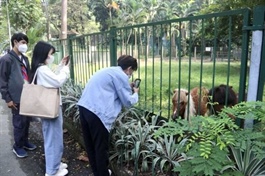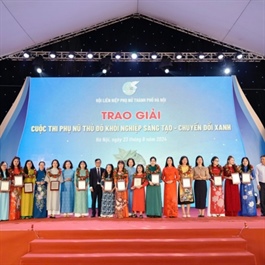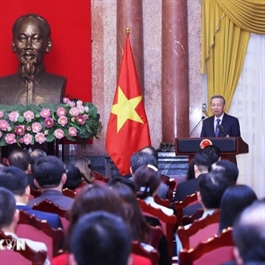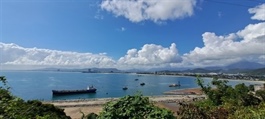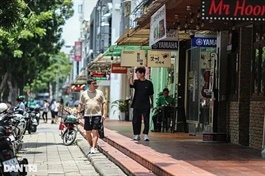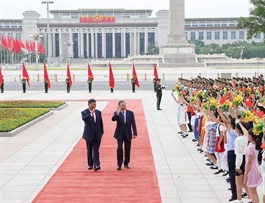Ba Ria-Vung Tau steps up FDI attraction
Ba Ria-Vung Tau steps up FDI attraction
The southern province of Ba Ria-Vung Tau is emerging as a prime investment destination in Vietnam, driven by a favourable investment climate and ambitious development plans.

As of mid-2024, Ba Ria-Vung Tau attracted over $33 billion in foreign direct investment (FDI) and VND400 trillion ($16.7 billion) in domestic investment. These projects hail from 30 countries and territories, as well as leading Vietnamese conglomerates and financial institutions, featuring advanced technology, low labour intensity, high productivity, and environmental friendliness.
At a conference on implementing the Ba Ria-Vung Tau provincial planning for 2021-2030 and promoting investment held in late March, the province unveiled a list of 92 projects to promote and attract investment through to the end of the decade. These large-scale projects are set to play a crucial role in the province's comprehensive and sustainable long-term development.
15 of the projects received investment approvals or adjustments, with 10 of them being domestic investments, with several projects boasting capital of VND800 billion or more.
The Ba Ria-Vung Tau provincial planning for 2021-2030, with a vision to 2050, approved in 2023, emphasises the goal of becoming a key growth engine in the southeast region, a national maritime economic hub, and ranking among Vietnam's top five localities for marine economic development. Additionally, the plan defines the target of transforming the province into a centrally run city by 2030, with a regional GDP per person ranging from $18,000 to $18,500.
Before green and sustainable development
During a seminar themed 'Towards carbon neutrality by 2050' held in mid-July in Vung Tau, Huynh Trung Hai, deputy head of the Energy Management Department at Ba Ria-Vung Tau Department of Industry and Trade, said, "Ba Ria-Vung Tau province has set out a direction for synchronous, rational development and diversification of energy types, prioritising the thorough and efficient exploitation and utilisation of renewable, new, and clean energy sources."
Modern seaport infrastructure serves the offshore wind power industry and other types of marine energy and industries
Specifically, Ba Ria-Vung Tau has implemented comprehensive programmes to tackle climate change, promote green growth, ensure efficient energy use, protect the environment, and reduce greenhouse gas emissions. In 2023, the province saved 173.38 million kWh of electricity, equivalent to almost 2.75 per cent of commercial output, cutting CO2 emissions by over 117,300 tonnes.
To achieve such results, Ba Ria-Vung Tau aims to spearhead Vietnam's green transition. Leveraging its wind, solar, and gas-based power potential, the province will become a hub for renewable energy, hydrogen, and green ammonia linked to the national energy industry.
“We're not just relying on natural advantages but creating breakthroughs in our development strategy. We've established two new industries: chemicals and renewable energy equipment manufacturing, particularly wind power,” Pham Viet Thanh, Secretary of Ba Ria-Vung Tau Party Committee and Chairman of Ba Ria-Vung Tau People's Council told VIR.
Ba Ria-Vung Tau plans to green its economic sectors, develop a circular economy based on science, technology, and digital transformation, and promote a green lifestyle. The province also aims to lead in developing green, smart, and modern port systems.
Creating more attraction for investors
Last year, Ba Ria-Vung Tau's economy reached over VND366 trillion ($15.2 billion), contributing 3.5 per cent to the country's total GDP. Gross regional domestic product reached over $8,000 per person, nearly double the national average.
The province is set to develop into a maritime economic hub, a national and Southeast Asian maritime service hub, a world-class tourism destination, and one of the Southeast region's largest industrial centres.
Thanh stressed that the province has been positioned as a key growth pole, consistently ranking in the nation’s top five for economic scale, budget contribution, and provincial competitiveness index. The province's economy is undergoing a shift towards industrialisation, modernisation, and urbanisation, and it boasts the highest regional GDP per person in Vietnam.
"Good planning creates good development space, attracting good investors who bring good projects. Therefore, developing and implementing the provincial planning scheme is crucial. We must seize this opportunity to create a model for allocating development space, remove bottlenecks, renew growth drivers, and create new ones, combining three strategic breakthroughs: multimodal transport infrastructure, digital transformation linked to administrative reform, and improved public governance capacity," said Thanh.
Ba Ria-Vung Tau's leadership has committed to accelerating administrative reform linked with digital transformation to foster a favourable investment environment. This includes ensuring transparency in information and long-term policy direction, guaranteeing security, and pledging to create optimal conditions for investors.
In April, Ba Ria-Vung Tau launched the 'BR-VT Smart' application on the Zalo platform, aiming to guide citizens and businesses through administrative procedures and online public services. The application offers guidance on online document submission processes, status enquiries for document processing, online payments, and instructions for using the land management information system, iLand.BRVT. It also provides information on the province's construction planning and other relevant details.



